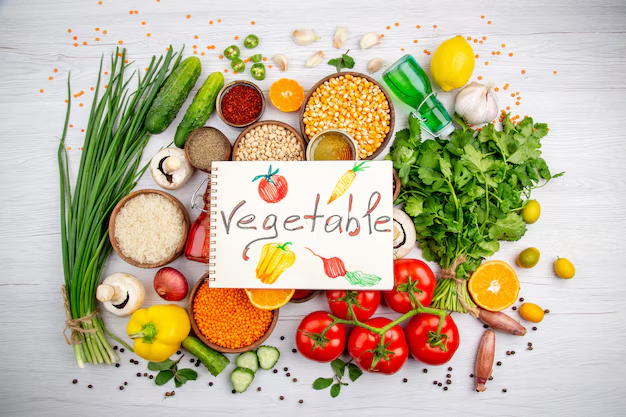Vegetables are the unsung heroes of a healthy diet. Packed with vitamins, minerals, fiber, and antioxidants, these natural wonders play a crucial role in keeping us energized, strong, and disease-free. From leafy greens to vibrant root vegetables, they provide a treasure trove of benefits that go far beyond just “eating healthy.”
In this blog, we’ll explore the extraordinary benefits of vegetables, why they are essential for your body and mind, and practical ways to include more of them in your meals. By the end, you’ll not only appreciate vegetables more but also feel inspired to make them the cornerstone of your diet.
Why Vegetables Are Nature’s Superfoods
Vegetables have been celebrated for centuries as a cornerstone of good health, and for a good reason. Here’s what makes them truly exceptional:
1. Nutrient Density
Vegetables are low in calories but high in essential nutrients, making them the perfect choice for anyone aiming to maintain or lose weight without compromising on nutrition. They’re rich in vitamins (like A, C, and K), minerals (such as potassium and magnesium), and antioxidants that combat harmful free radicals in the body.
2. Disease Prevention
Regular consumption of vegetables has been linked to a lower risk of chronic diseases like heart disease, diabetes, and certain cancers. For example:
- Cruciferous Vegetables like broccoli and Brussels sprouts contain compounds that may reduce cancer risk.
- Leafy Greens like spinach and kale are packed with heart-healthy nutrients like potassium and folate.
3. Digestive Health
The fiber in vegetables promotes a healthy digestive system, helping to prevent constipation and maintain a balanced gut microbiome. A healthy gut is essential for overall well-being, from improved immunity to better mood regulation.
4. Boosting Immunity
Many vegetables, such as bell peppers and tomatoes, are high in vitamin C, a key nutrient for a strong immune system. Others, like garlic and onions, have antibacterial and antiviral properties that support your body’s defenses.
Types of Vegetables and Their Benefits
Vegetables come in all shapes, colors, and sizes, each offering unique health benefits. Here’s a breakdown of some major types and why you should love them:
1. Leafy Greens
Examples: Spinach, kale, Swiss chard, lettuce
- High in iron, calcium, and vitamin K for strong bones and blood health.
- Contain antioxidants that protect against cellular damage.
- Great for weight management due to their low calorie count.
2. Cruciferous Vegetables
Examples: Broccoli, cauliflower, Brussels sprouts, cabbage
- Contain sulfur compounds that may reduce cancer risk.
- Support detoxification processes in the liver.
- Rich in fiber to promote digestive health.
3. Root Vegetables
Examples: Carrots, sweet potatoes, beets, turnips
- Excellent sources of energy due to their complex carbohydrates.
- High in beta-carotene, which converts to vitamin A for eye health.
- Beets are great for improving blood flow and lowering blood pressure.
4. Nightshades
Examples: Tomatoes, eggplants, bell peppers, potatoes
- Rich in vitamins A and C and antioxidants like lycopene (especially in tomatoes).
- Support skin health and reduce inflammation.
5. Alliums
Examples: Garlic, onions, leeks, shallots
- Have natural antibacterial and antiviral properties.
- Promote heart health by improving cholesterol levels and reducing blood pressure.
f your meals. Here are some ideas:
1. Start Your Day with Vegetables
- Add spinach or kale to your morning smoothie for a nutrient boost.
- Include diced peppers, onions, and tomatoes in your scrambled eggs or omelets.
2. Make Vegetables the Star of Your Lunch and Dinner
- Prepare hearty salads with a mix of leafy greens, roasted vegetables, nuts, and seeds.
- Swap traditional pasta for zucchini noodles or spaghetti squash.
- Stir-fry vegetables like broccoli, bell peppers, and snap peas with lean protein for a quick, balanced meal.
3. Snack Smart
- Enjoy raw veggies like carrots, cucumbers, and bell pepper strips with hummus or guacamole.
- Make kale chips by baking seasoned kale leaves until crispy.
4. Sneak Vegetables Into Favorite Dishes
- Add grated zucchini or carrots to meatloaf, burgers, or muffins.
- Blend cooked cauliflower or butternut squash into soups for added creaminess.
5. Experiment with New Recipes
- Try international dishes that highlight vegetables, such as ratatouille, stir-fried bok choy, or Indian curries loaded with veggies.
- Roast a mix of vegetables with olive oil, garlic, and your favorite herbs for a simple yet flavorful side dish.
Sustainability and Vegetables
Eating more vegetables is not just good for you; it’s good for the planet. Plant-based diets have a lower environmental impact than diets rich in animal products. By choosing locally-sourced and seasonal vegetables, you can reduce your carbon footprint while enjoying the freshest flavors.
Building a Balanced Plate
A healthy diet isn’t about eating only vegetables but about making them a significant part of your meals. Follow these tips to create balanced plates:
- Half Your Plate: Fill it with a variety of vegetables.
- A Quarter of Your Plate: Include a lean protein source like chicken, fish, or tofu.
- The Remaining Quarter: Add a whole grain like brown rice or quinoa.
Common Myths About Vegetables
Myth 1: Fresh Is Always Best
While fresh vegetables are fantastic, frozen vegetables can be just as nutritious. They’re often frozen at peak ripeness, locking in nutrients.
Myth 2: Vegetables Are Bland
With the right seasonings, cooking methods, and pairings, vegetables can be incredibly flavorful.
Myth 3: Eating Too Many Vegetables Is Bad
Unless directed otherwise by a healthcare provider, it’s hard to overdo vegetables. Focus on variety and balance.
Final Thoughts
Vegetables are the cornerstone of a healthy, vibrant life. By embracing their incredible variety, flavors, and benefits, you can transform your meals and improve your overall well-being. Start by adding an extra serving of vegetables to one meal today, and watch how your energy, mood, and health improve.
Remember, every bite counts. Make vegetables the star of your plate and unlock the full potential of nature’s superfoods. Your body will thank you!
